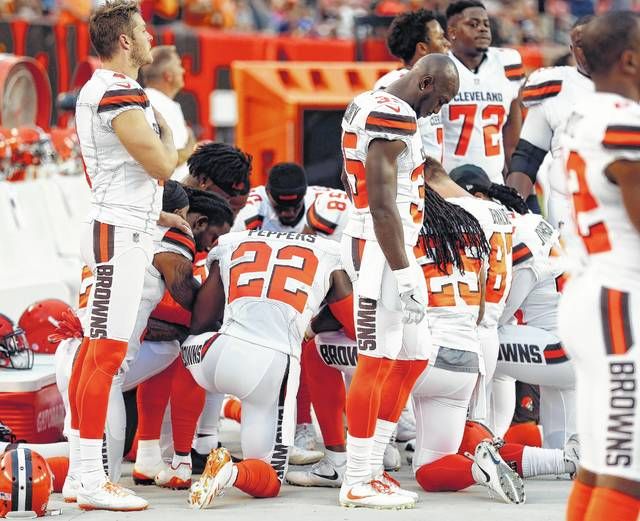Click here to subscribe today or Login.
Pitched battles between owners and players in professional sports can leave lasting scars on both sides.
Remember the National Football League strike in 1987? Sports columnists derided the season as a sham. Striking players lost a combined $80 million, and owners suffered from a drop in ratings and gate receipts. And there was the 1994 Major League Baseball strike. The World Series was canceled for the first time in 90 years, owners lost $1 billion, and players were out many millions more. The following season, attendance dropped 20 percent.
That’s the grim history the NFL risks repeating as it fumbles its way through the controversy over whether players should stand during the national anthem.
Team owners will meet next week in New York to decide whether to force players to stand during the playing of “The Star-Spangled Banner.” That’s the direction the league seems to be taking — Commissioner Roger Goodell has already said the NFL will propose it to owners, and at least one of them, Jerry Jones of the Dallas Cowboys, has said any of his players who do not stand for the anthem won’t play.
The backdrop for all this was that NFL Sunday three weeks ago like no other before it. After President Donald Trump told a rally in Alabama that any player who knelt during the national anthem was “a son of a bitch,” several owners locked arms with their players on game day as the anthem played. Many teams issued statements denouncing Trump’s remarks, and almost all of them defended players’ rights to express themselves.
The sentiment from owners that day was clear: They had their players’ backs.
Since then, reality has set in. Ratings have been flagging for some time, well before the anthem controversy. A segment of the NFL’s fan base disapproves of player protests during the anthem — disapproval stoked by Trump’s divisive remarks. There’ve been rumblings of a fan boycott, perhaps on Veterans Day weekend.
This is the moment when the dispute likely tips toward respectful resolution or dangerous escalation: If owners force players to stand or face fines, suspensions or both, will the players acquiesce? Or will a growing number of them fight back, kneeling together in solidarity?
It seems eons ago that San Francisco 49ers quarterback Colin Kaepernick sat during the anthem at a preseason game to protest the killings of unarmed African-Americans by police. That was last year, and he remains out of a job, even though he’s arguably better than many backup quarterbacks, and some starters. At the time of Kaepernick’s protest, we backed his right to make his statement. We called it the “patriotism of dissent.”
We still support a player’s right to protest. At the same time, it’s clear that these player protests aren’t happening on a sidewalk or city plaza — they’re happening in the workplace. The owners have a legal right to set boundaries on the behavior of their employees. It’s disappointing that, three weeks after backing their players’ right to express themselves, they’re now rethinking that stance. But they have the right to impose consequences on players who refuse to obey management directives.
What the owners, and the players, shouldn’t forget is the most powerful party in play: the league’s fan base. Opponents of the protests and supporters of the players could wind up conjoined in a large-scale boycott, declared or de facto. That is, millions of Americans are free to declare a pox on owners and players, and then to abandon the game.
Football’s already gripped by another existential challenge — the impact of the degenerative brain disease CTE on the game’s popularity at every level, from the pros to youth leagues. The NFL doesn’t need another full-blown crisis. Next week’s meetings between league officials and owners should be about finding common ground with players — perhaps allowing athletes to continue making their point at NFL games, but not during the national anthem.
— Chicago Tribune





